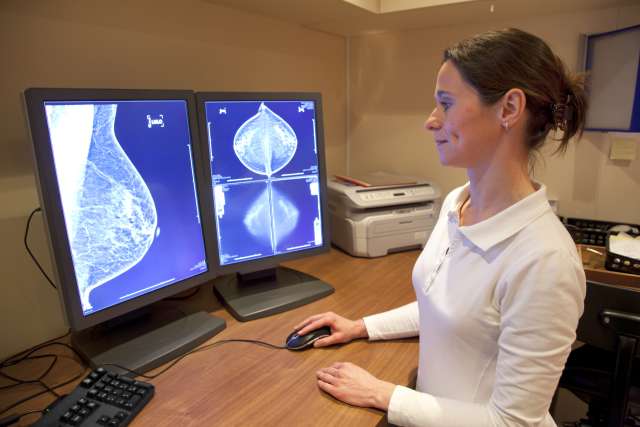Moussa Raiszadeh worked in the nuclear medicine field for more than three decades. In 2021, five years after his prostate cancer diagnosis, he found himself on the other side of a PET scanner.
“My health had deteriorated,” says Raiszadeh, 75, who had already undergone androgen deprivation therapy, androgen receptor-targeting therapy, and chemotherapy by the time his oncologist referred him to Jeremie Calais, MD, MSc.
For his new therapy, medical staff at UCLA Health injected his veins with a radiotracer used to image prostate-specific membrane antigen (PSMA) positive lesions. Since PSMA is overexpressed in prostate cancer, the diagnostic agent would bind to and light up cancer cells during the scan, revealing exactly where in his body the disease had spread.
Next, Raiszadeh would receive six rounds of a new radioactive drug that works in partnership with the PSMA PET scan. After the PET scan revealed PSMA, the new radioactive drug (Lutetium177-PSMA) — now — would bind to the same molecules and kill his cancer with radioactivity.
The dual approach of using radiopharmaceuticals to both identify and treat cancer is an emerging field of nuclear medicine called “theranostics.”
“You see what you treat, and you treat what you see,” says Dr. Calais, an associate professor at the David Geffen School of Medicine and director of the Ahmanson Translational Theranostics Division’s clinical research program.
UCLA Health was one of the first sites in the United States to participate in a phase II clinical trial to test the safety and efficacy of the Lutetium177-PSMA radionuclide therapy. A conventional scintigraphy imaging suite was converted into a room for the trial, which included two infusion chairs and was specially outfitted for radiation safety.
Then, in 2018, Novartis acquired the rights to the drug and initiated a phase III randomized study, called the VISION trial. The U.S. Food and Drug Administration (FDA) approved Pluvicto for patients with metastatic castration-resistant prostate cancer (mCRPC) in March 2022.
Now, building off the success of the trial and growing demand for the nuclear medicine therapy and others like it, UCLA Health is set to open its first Outpatient Theranostics Center this year. The center is the outcome of clinical and research faculty work led by Dr. Calais and Martin Allen-Auerbach, MD, a clinical professor of Molecular and Medical Pharmacology, as well as colleagues in urology, radiation oncology, radiology, and oncology, among others.
‘One of the largest centers of its kind’
The 3,000-square-foot facility, which will be housed on the seventh floor of the 100 Medical Plaza building on UCLA Health’s Westwood campus, will include eight infusion chairs and have the capacity to deliver 80 transfusions to patients per week, or 4,000 treatment cycles per year.
Four nurses, three nuclear medicine technologists, two radiation safety specialists, and nine physicians will be dedicated to the center, which will treat patients with advanced prostate cancer, neuroendocrine tumors and thyroid cancer.
“Drugs that are radioactive cannot be administered in a large volume in a typical outpatient medical center. To handle more patients and radiopharmaceutical management, we needed a facility like this,” Dr. Calais says.
“This will be one of the largest centers of its kind in the U.S. — it’s exciting to be on the forefront of theranostics.”
Since the PSMA therapy is a targeted treatment, it is safe for patients and comes with low side effects, according to Dr. Calais.
For Raiszadeh, the therapy was the difference between life and death. By 2021, his PSMA PET scan revealed that the prostate cancer had spread to his bones and had become resistant to chemotherapy. His oncologist, Matthew B. Rettig, MD, suggested the Pluvicto treatment. The Novartis VISION trial had ended, but Raiszadeh was able to receive the treatment under the FDA’s “expanded access” program, which gives patients with life-threatening disease access to investigational therapies.
After receiving his final dose of Pluvicto in April 2022, his levels of prostate-specific antigen (PSA) were nearly undetectable — a sign of good health.
“I had accepted that this is a disease that they don’t cure, but I knew I had to do everything I could to delay its progression,” Raiszadeh says.
He has since lived a normal life in Southern California surrounded by his wife, his adult children, and a new grandchild: “I feel very fortunate.”
He says he is especially grateful for the care he received at UCLA under the supervision of an “amazing” nurse manager, Lindy Gardner, RN.
Currently, Pluvicto is only approved for patients with advanced prostate cancer that have progressed after hormonal therapies and at least one chemotherapy. Dr. Calais and other researchers are currently leading clinical trials at UCLA to determine whether PSMA therapy can be used for patients with early-stage cancer.
The center is funded by the Ronald Reagan Medical Center, with support from the David Geffen School of Medicine and the UCLA Jonsson Comprehensive Cancer Center. It is expected to open this summer.
In addition to Dr. Calais and Dr. Allen-Auerbach, clinical faculty providing theranostic services include: Shadfar Bahri, MD, Mathias Benz, MD, Johannes Czernin, MD, Pawan Gupta, MD, Andrew Quon, MD, Ali Salavati, MD, Heinrich Schelbert, MD, and Daniel H Silverman, MD, PhD.
Lauren Ingeno is the author of this article.




